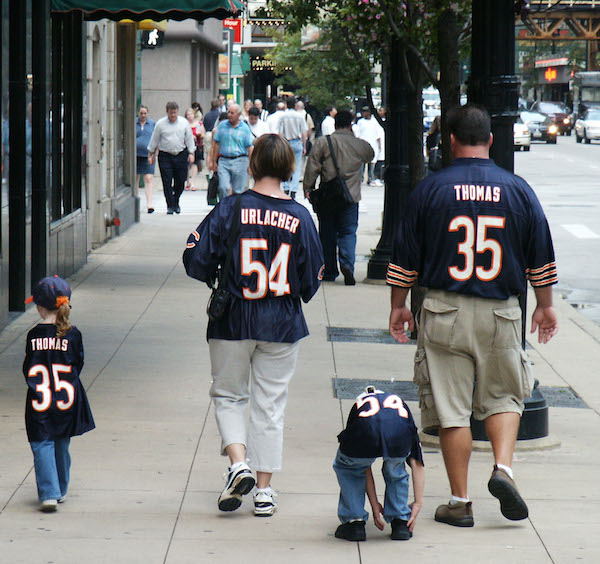Dear Sports Fan,
I’m sick and tired of being sick and tired about NFL teams hiring domestic abusers and then not being punished for it. The Bears shouldn’t be able to sign Ray McDonald, a known domestic abuser, and then cut him without penalty when he abuses again. What can we do about this?
Thanks,
Casey
Dear Casey,
What a dispiriting news item to break on Memorial Day! Yesterday, news broke that Ray McDonald, a defensive end who had been signed this offseason by the Chicago Bears despite having been arrested more than once for domestic abuse and sexual assault, had been arrested again. This time he was arrested for domestic violence after apparently assaulting a woman who was holding a baby. In a good news/bad news kind of action, the Bears immediately cut him from their team. The good news is that the public’s reaction to Ray Rice has forced teams to shift their stance from supporting arrested players to cutting them. The bad news is that the Bears as an organization get off scot free. They will suffer no penalty worse than having to go out and find another defensive end to sign.
Ordinarily, I wouldn’t argue that organizations should be responsible for the actions of all their employees. After all, when an employee of Chipotle, to pick a corporation totally at random, is arrested for domestic abuse, no one calls for Chipotle to be penalized in some way. This feels different for three reasons:
- NFL players are not just players. They are also all spokespeople for their teams. They all speak to the media and public. It’s part of their job requirements. If thought of as spokespeople, it becomes more reasonable to hold the team accountable. A spokesperson is supposed to represent the company and the company is responsible for picking people who will represent them well.
- The Bears knew what was up with Ray McDonald and they chose to hire him anyway. Their investigation of his character before signing him was so slipshod that it screams of gross incompetence or (more likely) an organization that simply doesn’t care very much about domestic assault. Jane McManus lays this case out spectacularly well in this ESPNW article.
- Thanks to last year’s giant domestic abuse story, the NFL is now an institution that people look at to measure the progress of society in addressing domestic abuse issues. It’s important for its own future as a league but also for society as a whole for the NFL to show progress on this issue.
Mike Freeman of Bleacher Report calls for punishing teams by taking draft picks away from teams that sign players with multiple arrests in their past. Taking draft picks away is a sufficiently painful way to punish a team but this potential policy is problematic for a couple of reasons. First, although there is no law against refusing to hire people with multiple arrests, it’s not a path I’d like to see organizations follow. Beyond simply an instinct for innocent until proven guilty (a rationale that need not hold in hiring decisions) it also seems regressive to implement this policy during a period of national recognition of widespread discrimination and racial bias in our police forces. A league that is 68% African-American has no business implementing that type of policy right now. The other problem is that this type of policy will almost inevitably lead to some subjective decisions on the league’s part. What if the multiple arrests are for a minor crime like shoplifting and are a decade old? Does it matter if the player was convicted? Given the NFL’s poor recent history of decision-making, giving them more discretionary power seems like a recipe for disaster.
My favorite story about penalties in sports is the habit of rugby officials to simply yell “play on” when players are fighting. It’s the easiest way of getting them to stop. By continuing the game, it creates a disincentive for the players to continue their fight. No one wants to miss too much of the game. This is exactly how the NFL should handle punishing teams for signing players who are later arrested. Instead of creating a penalty, create a disincentive. The easiest way to do this is to take away a team’s ability to cut players so easily. If teams could not get out of contracts with players so easily, they would be more careful about who they sign. Either force teams to hold players for at least a season after they sign them — using up a prized roster slot — or make it so that the money they were going to pay him can not be used to replace him with another player.
How feasible is this change? The NFL has a soft salary cap, so this would not require too much restructuring. There’s also a clear model for this. The NBA and NHL are much closer to this model today than the NFL is and it hasn’t hurt their popularity one bit. The right of NFL teams to cut players whenever they want with no financial penalty is not inalienable. Nudging this dynamic just a little towards a more lasting commitment on the part of the team will force them to care more about their players in a variety of ways. It could have many other benefits but it will absolutely force teams to think twice about hiring players with McDonald’s past and present behavior.
Thanks for reading,
Ezra Fischer

